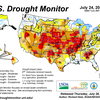Dan Charles appears in the following:
Exploring Coffee's Past To Rescue Its Future
Friday, April 26, 2013
At the Center for Tropical Agricultural Research and Education (CATIE) in Turrialba, Costa Rica, you can touch the history of coffee — and also, if the optimists have their way, part of its future.
Here, spread across 25 acres, are coffee trees that take you back to coffee's origins.
...Coffee For A Cause: What Do Those Feel-Good Labels Deliver?
Wednesday, April 24, 2013
What does it take to find guilt-free coffee?
Much of our coffee comes from places where the environment is endangered and workers earn very little — sometimes, just a few dollars for a whole day's work. Coffee farmers have helped cut down tropical forests, and most of them use pesticides.
...How Coffee Brings The World Together
Monday, April 22, 2013
Coffee is more than a drink. For many of us — OK, for me — it's woven into the fabric of every day.
It also connects us to far corners of the globe.
For instance, every Friday, a truck pulls up to the warehouse of Counter Culture Coffee, a ...
Fertilizer Shows Its Deadly Side
Friday, April 19, 2013
My first reaction when I heard details of this week's deadly fertilizer explosion in Texas was horror.
My second thought was, "Maybe I shouldn't have pushed to change that headline."
National Geographic magazine just published in its May issue my article about how nitrogen fertilizer has shaped our ...
As Promised: Obama Wants To Overhaul Global Anti-Hunger Efforts
Wednesday, April 10, 2013
The White House unveiled its proposal Wednesday for drastic changes in government programs that donate food to fight hunger abroad — and surprised no one.
As we reported last week, rumors of such an overhaul had been circulating for weeks, arousing both hope and anger among organizations involved ...
A Political War Brews Over 'Food For Peace' Aid Program
Thursday, April 04, 2013
Washington is awash in rumors this week that the White House is planning major changes in the way the U.S. donates food to fight hunger in some of the world's poorest countries.
It has set off an emotional debate. Both sides say they are trying to save lives.
America's ...
Are Agriculture's Most Popular Insecticides Killing Our Bees?
Monday, March 25, 2013
Environmentalists and beekeepers are calling on the government to ban some of the country's most widely used insect-killing chemicals.
The pesticides, called neonicotinoids, became popular among farmers during the 1990s. They're used to coat the seeds of many agricultural crops, including the biggest crop of all: corn. Neonics, ...
Nation's Biggest Honey Packer Admits 'Laundering' Chinese Honey
Friday, March 08, 2013
There was bombshell news from the world of honey two weeks ago, and somehow we missed it. Two big honey packers, including one of the largest in the country — Groeb Farms of Onsted, Mich. — admitted buying millions of dollars worth of honey that was falsely labeled.
The ...
In A Grain Of Golden Rice, A World Of Controversy Over GMO Foods
Thursday, March 07, 2013
There's a kind of rice growing in some test plots in the Philippines that's unlike any rice ever seen before. It's yellow. Its backers call it "golden rice." It's been genetically modified so that it contains beta-carotene, the source of vitamin A.
Millions of people in Asia and ...
Wild Bees Are Good For Crops, But Crops Are Bad For Bees
Friday, March 01, 2013
Some of the most healthful foods you can think of — blueberries, cranberries, apples, almonds and squash — would never get to your plate without the help of insects. No insects, no pollination. No pollination, no fruit.
Farmers who grow these crops often rely on honeybees to do the ...
How One Man Tried To Slim Down Big Soda From The Inside
Monday, January 28, 2013
Why Greek Yogurt Makers Want Whey To Go Away
Wednesday, November 21, 2012
Monster Beverage Under Fire As Reports Link Deaths To Its Energy Drinks
Tuesday, October 23, 2012
Why Organic Food May Not Be Healthier For You
Tuesday, September 04, 2012
Midwest Drought's Ripple Effects
Monday, July 30, 2012
The drought continues throughout much of the United States. NPR food and agriculture correspondent Dan Charles looks at the effects on everything from factory farms to local food prices.













